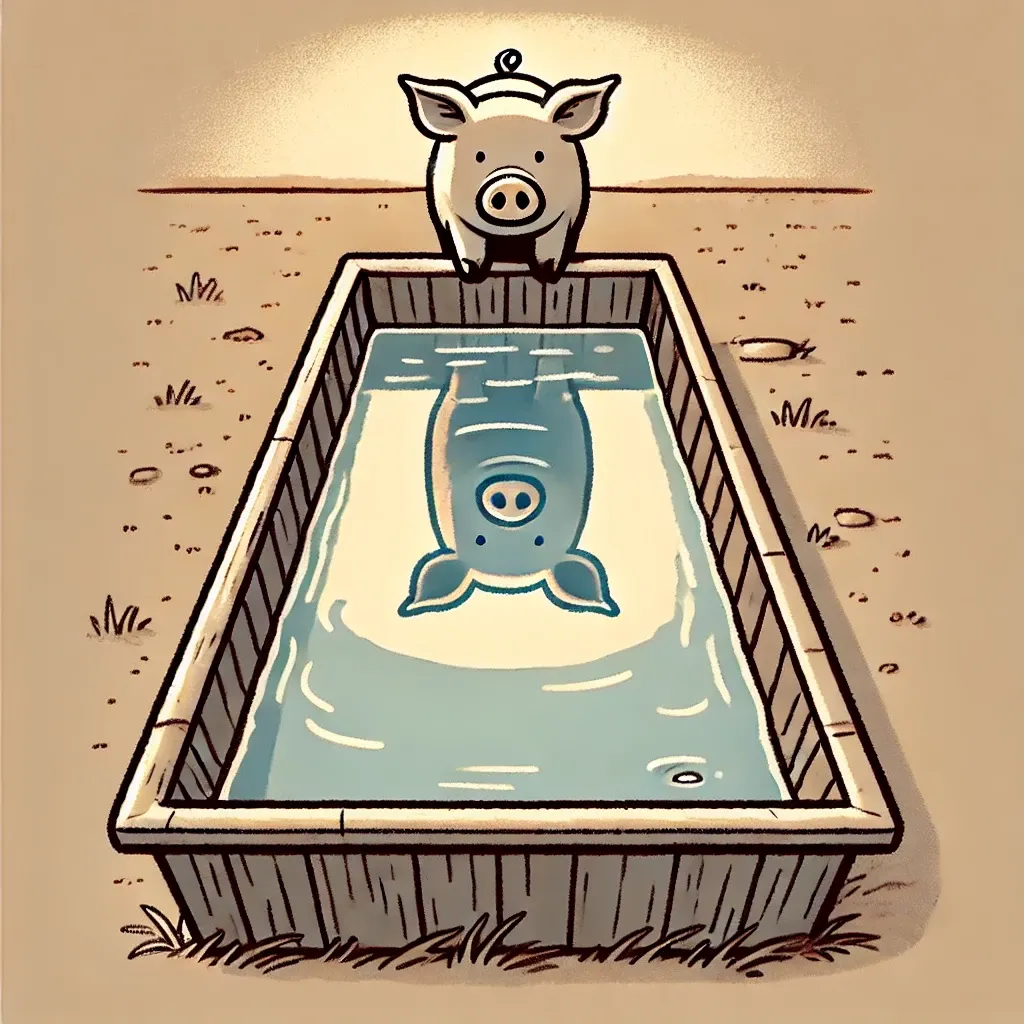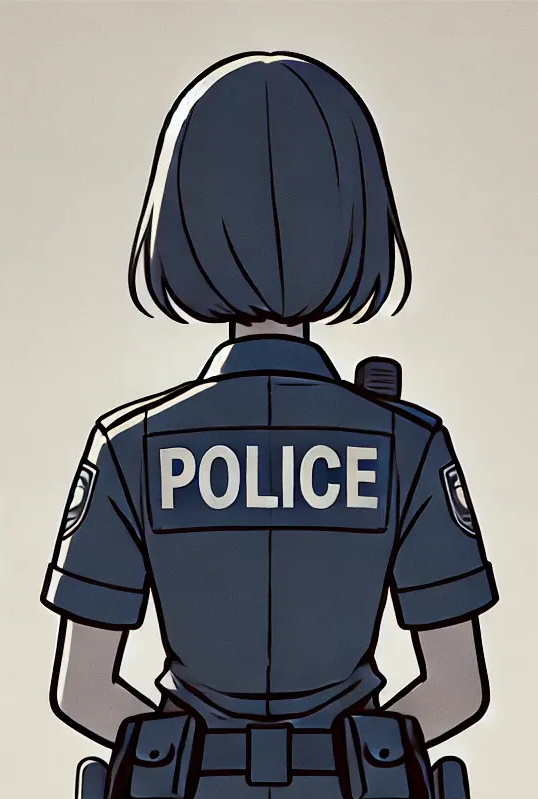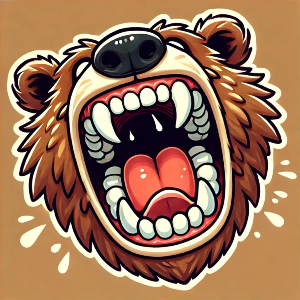BETTER TO BE A PIG - YEAR ONE
Year one
Tubs, though he was yet to receive this name, was a piglet of a mere eight weeks. So little, but growing rapidly now he was eating solids, leaving behind the silky milk of his mother. As with many of the animals in this story, he could speak, but given his immaturity, his words and thoughts were confused, straining to reach points of clarity before descending into gibberish.
“I see tworms,” he might start, “Toes and tworms, make piddles,” he might continue. Cute, but as you can see, altogether nonsense.
He would receive his name from a stranger, very soon in fact, though how he left the care of his mother and the safety of the farm is not clear and never will be in this story. Some mysteries are never solved, some puzzles lack the sufficient pieces. But vanished he did. Discovered he was, on the banks of the bay by Bushman Joe.
But in those first months on the farm, he had received exactly what piglets required. Tubs got all he needed to build a strong and sturdy frame, the care and routine to establish the mental scaffolding that all young creatures require, safety and shelter to ensure he didn’t meet an early demise at the instincts and jaws of wolves and bears. Being a piglet was a fine existence, when you weren’t being eaten.
His face, his little wet nose, the light pink pigment that coated a soft, puggy complexion. It was too cute really. His little brown eyes, tiny flecks of green and yellow sparkling in the sun and in the reflections from the water trough. He would have been proclaimed, no doubt, if there was ever such a survey conducted, the cutest pig that had ever lived. Even his blemishes, brown and white markings scattered across his body like chocolate droplets, were so perfectly arranged that they formed elegant constellations, the sort that sailors would happily stare at for hours, committing their oceanic journeys to the imperfections on this little pig’s skin just so they could be with him.
Beautiful. Kind. Soft. Playful. Tubs was irresistible to people, and to the wolves and bears that circled the farm.
Maybe that was how he ended up in the city. Maybe he was taken one night, scooped up by fierce, hairy claws only to slip free in the dark, only to fall into the river and be swept out to the bay. Maybe the wolves got to him, prising him away from his kin only to misplace him near where the logging trucks gather their loads, and where a little, sleepy pig might find a place to snooze in the freshly felled pines.
“Big sticks,” he might have said to no-one. “Sharp fingers,” he might have muttered to the bear that took him.
Of course, we will never know.
What the records do show is that on the banks of the bay, where the dockers wield their giant machines and where huge ships obscure the horizon, Bushman Joe found a pig, no more than two months old. He was walking, the Bushman that is, taking in the dirty morning air as he often did in his retirement. A brisk morning too, hence the shivering little piglet, the sun just creeping up into the sky to warm and light the day.
“What do we have here?” said Joe to the sun, a rare conversation to have on his early morning walks.
He imagined the sun’s reply, “A pig, I believe; could be alive, could be dead; you’ll have to check to see,”
With that Bushman Joe climbed down on to the shingle, its collective mass both grey and foul smelling from silt left behind as the polluted tide rolled away. He placed a hand on the piglet’s chest, a faint beat just about declaring itself, a subtle rise and fall barely present due to the shallowest of breaths.
“What you can find on a morning stroll. As they say, early bird and all,”
“Tworms,” whispered the little pig.
“Tworms, indeed,” replied the Bushman as he tended to the sickly creature.
Bushman Joe would attentively care for Tubs that day and for the few weeks it would take for the little pig to return to health. He named him on the first night they stayed in each other’s company too. The little pig ate so much that day and night that his withered belly swelled like a blimp preparing for take-off.
“You like your food, don’t you, little one?” the Bushman declared, his face lit by the glow of the fire, “I shall call you Tubs,”
“Tubs,” came the whispered response. It seemed the piglet approved.
That afternoon, some fifty clicks north of the city, the police had cordoned off the campus of Taylor’s Retreat. There were three buildings in all, old wooden scout shacks that had been converted to a dormitory, a kitchen and bathrooms. The massacre, at least that was how it appeared to the police, had occurred in the kitchen, most likely in a frenzy of slices and stabs, of screams and hysterical laughter. It was a gruesome scene to take in.
“How many?” First Constable Harris asked.
“It’s not that easy to tell. At this stage there are 4 heads,” another officer replied.
“Oh dear,” Harris was not pleased, “Let’s hope it all totals up, then,”
“I’ll double check the limbs,”
“Good lad,”
The state of the kitchen suggested this was not a stealthy, pre-meditated, carefully constructed group execution. The nature of it, as much as could be elicited at this stage of the investigation (the messy bit), presented a portrait of madness, of brutality, of impulsive inflictions. The perpetrator was all violence, commitment and violence, commitment, violence and no hesitation. A monster, perhaps?
The lead officer, Senior Sergeant Stone, arrived at the scene later than she would have preferred. However, her first impressions were that the team had done well in preparing the site for investigation. Lucky too that this was the Barren Hills. Nothing much around in all directions, no public, no media, no attention, no interference. For a crime scene it was perfect, though horrific too, of course.
“What do we know?” she asked First Constable Harris.
Harris, though an experienced officer, did not have the constitution for this type of policing. He looked pale and damaged.
“Harris! Focus, please. What do we know?”
“Sorry, ma'am,” he replied. “Four dead in the kitchen, likely an attack with a sharp implement, could be an animal attack too,”
“Evidence?” Stone asked.
“Some of it looks like teeth marks, but too hard to tell. No fur, or, I mean, we haven’t seen any fur, not yet,”
“Continue,”
Harris took a breath and held down his lunch, “A group of five had booked the retreat for three nights. They stayed here one night before the attack,”
“Which happened when?”
“It all seems fresh, ma’am. So, the attack could have happened this morning,”
“And who found the bodies?”
“The owner, ma’am. Given the remoteness and unreliable weather, the owner always checks in. He lives in the city, and drove up this morning,”
“Why did he take so long to report it, we got the call at, what, 12?”
“Phone reception, ma’am. It’s a dead spot here, pardon the phrasing. He had to get back to the highway to report it. Plus, he passed out for a bit,”
Stone paused and did calculations quietly in her head and then continued with her queries. “Who’s interviewing him?”
“Not sure. Flynn, maybe? They are at the hospital, given the owner’s episode. He’s shook up pretty bad,”
“Ok, good job, Harris. And the other one?”
“The other?
“Member of the group, Harris. You said five came up here,”
“Yes, five booked, we’re not sure if five arrived. We’re following it up, now,”
“Good, let me know as soon as you know,”
“Yes, ma’am,”

Stone began to circle the site, it was laden with disaster, with horror, with the debris of a terrible act. The kitchen was point of gravity for it, the black hole drawing everything cruel and explicit into its centre. The rest of the campus, at first glance, was from another world: tidy, free of blotches and sprays of fluid. Against the vast void of the landscape around it, the campus was very much a sanctuary. And yet, the kitchen. Its mince and torture were there like a cancerous, indelible root that had taken hold of the environment.
“Horrible,” Stone muttered to herself.
Harris appeared again, his fragility subsiding a little with signs of eagerness and industry. “Ma’am!”
“Yes,” Stone said.
“There were five. Jimmy at the station…”
“Constable Perkins at the station,” Stone corrected.
“Yes, sorry, Constable Perkins has, well, Jimmy told me he’s gone through the social media feed for them. Five definitely came here. We think Sheila McClair is missing,”
“Why do I know that name, Harris?”
“Sniff, Ma’am, Sniff,”
“Fuck!” Stone’s face shifted to resignation, “Fucking Sniff McClair. That feral, little shit,”
It was a month or so later when Tubs, having regained his strength, his youthfulness and vitality, stood admiring the return of those little plump cheeks in the mirror. His eyes, remember the two little brown eyes with flecks of colour adorning the iris, they were now staring back at himself. Mirrors were a new thing to this piglet.
“Do I really look like this, Joe?” he asked. His vocabulary and sentence construction vastly superior to what it had been on the farm.
“Yes, Tubs,” responded Bushman Joe from his armchair. The old man peered over his shoulder to watch the little pig study himself in a small mirror propped up against the wall.
“Exactly like this?” Tubs didn’t appear convinced.
“Well, yes, though, I think your sort of flipped in a mirror,”
“Flipped?” Tubs echoed, unsure.
“Yes, maybe. Like your left side is on the right,”
Tubs wiggled his left ear. “I’m not sure about that, Joe. My left ear is definitely on the left still,”
“Yes, I think it’s more how you see yourself in the mirror is not how others see you. You’re sort of the other way round”
Tubs was quiet. He was very much not convinced.
“Do you understand?” Joe continued.
“No, not really,”
“Well, it’s a little hard to explain. But how you see your left and right in the mirror is not how we see your left and right. We see you front on, not your reflection, so it’s kind of…how to describe it…flipped. Does that help?”
“Will everyone see me like that, front on and flipped?”
“Yes, I think so,” Even Bushman Joe wasn’t convinced.
There was a knock at the door. Tubs’ perplexion broke with excitement. “Sandy’s here!” he shouted.
And indeed, she was.
“Hi, Dad,” she said before giving the old man a kiss. “And hello, Tubs,”. She crouched down to give the little pig a hug, but his bottom and tail was so shaky and wriggly with joy that his back trotters kept slipping on the hard wood floor. “Tubs, I think you’ve grown since yesterday,”
“Have I?” the little pig responded, his voice high with excitement, “Really?”
“I think so,”
“Sandy, can I ask you something?”
“Yes,”
“But you have to be honest?”
“Ok,”
“Do I look a bit flipped?
Sandy couldn’t explain it to Tubs any better than her father had. But at least Sandy had an idea of how to show Tubs what she meant.
“Now, stand still,” Sandy said as she lined up her phone for a picture.
“Did you take it yet?” said Tubs.
Sandy giggled. “No, you have to stop being so wobbly, Tubs. Calm your body. That’s it. 3, 2, 1. Got it!”
Tubs inspected the picture. “Is that what I look like to you?”
“Yes, little pig, it is,”
“But I’m sort of…flipped,”
“Let me change the picture,” Sandy flipped the picture horizontally on the screen of her phone.
“That’s better, that’s like my reflection. I prefer my reflection,” Tubs’ excitement had all but gone at this stage, replaced by something darker.
“Are you ok, Tubs?” Sandy asked.
“Is that how people see me? It looks like me, but it’s not me. I want people to see me how I see me, like in the mirror,”
“I’m not that old, Tubs, but I have learnt some things in my life. The big one is that you can’t control how people see you. Sometimes, a lot of the time actually, they will just see what they want to see. And if they’re only going to see what they want to see, then there’s not much you can do about it,”
Tubs thought about that for a moment, his little piggy brain trying to grasp the lesson presented to him. “Sandy. Is that a good thing to have learnt?”
“Crikey, Tubs. Hey, why don’t I post this picture? Is that alright with you?
“Does that mean lots of people will see me?”
“Maybe, only if they share it,”
“Ok, maybe post the real one and flipped one, then people can decide which one to share,”
“Good idea. It’ll be an experiment,”
Later that night, about an hour after Tubs had fallen asleep on his cushion near the fire, Sandy sat with her father.
“Did you see the latest on them killings?” Bushman Joe asked.
“Crazy,” Sandy replied, “The city has gone mad,”
“I think she did it,”
“What the missing one?”
“Yeah, killed her friends and then ran off into the hills somewhere,”
“My friend went to school with her, year above. Said she was a bit of a bitch, a pot head too,”
Bushman Joe shook his head with disappointment. “What’s her name again?” he asked.
“McClair, Sheila McClair, but everyone calls her Sniff,”
“Hope they find her soon, then those poor families can have some closure,”
The Barren Hills were not entirely barren; some landscapes, like those around Taylor’s Retreat, were bare and windswept, mostly patches of yellow grass and lichen struggling to survive on rock and parched earth. Other areas though were thick with growth, dark forests etched and established and thriving in the rich soil that washed down from the empty plains into the valleys. From up high the vegetation cut like rivers through grey and gold.
The vast area, some 250,000 hectares, was inhabited too. Bears, wolves, large cats, river cod that could bite your foot clean off, things that creeped and things that crawled and fierce birds that fed on them. The raptors of the Barren Hills were predominantly old-world vultures, relics of the Cryptogyps that used to dominate the skies, locked in warfare with the hawks and harriers, in a quarrel that had no beginning, and likely no end.
There were others too, the lost. Farm animals that had strayed from their homes long ago, turned feral breeds that were familiar to the eye, but their madness diagnosable once you got a good look at them. They came and went, picked off by the larger creatures as they no longer huddled together in herds. Rather they wandered aimlessly, occasionally violently, stuck between their sedate bovine, caprine and ovine histories and their new, wild evolution.
All this made it slow, hard work for the police. Without the option of camping every night, officers had to drive up from the city, traverse the muddy tracks when the weather was favourable, and slowly cross the landscape on foot from the site of the massacre. Six weeks had passed, and still nothing had been found. A few drops of blood a hundred metres or so from the retreat, but the Barren Hills gave nothing up easily, it kept its secrets hidden. Stone was trying her best to coordinate the endeavour, but it seemed unlikely they would ever find Sniff McClair, their suspect principal.
But, of course, Sniff was there. Her fingers numb and scratched, her breathing ragged. Her cave, her prison, hidden behind a wall of tangled roots and half-buried boulders, barely more than a shadow among shadows. At times the silence was almost absolute, only the faint trickle of water seeping from some unseen spring in the rock to punctuate the quiet. Other times she cowered as her captors bellowed their wet roars in sport, to see her cringe and shrivel in their presence. In those moments, whether the quiet or the shrill, she saw fragments of screams, flashes of red and teeth and claws, the butchering of her friends.
Why keep me alive? That thought came to her every day, especially when her ambitions were for a swift death.
But the bears didn’t tell her. They didn’t explain why they brought her a little food every day, edible roots, a little raw fish. There was no need in their mind to let her know they were keeping her alive for winter, when she would be valuable protein and plaything for them as they bathed in their hibernation.
